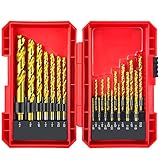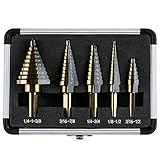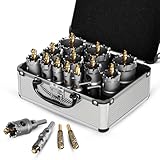My curious friend Ranjiv applied all his muscle power onto the drill machine, but there wasn’t even a dent in the stainless steel pipe. Eventually, the drill bit snapped, and he got injured. It was about ten years ago when I purchased a used drill machine (my first power tool) from the market, and as soon as I reached my apartment, my friends started to experiment with it. We were totally unaware that we needed specialized drill bits for every material, whether we talked about metal, wood, or concrete.
I have been into DIY things for a long time and have made several projects from metal, too, such as recently fabricated a metal railing for my balcony from scratch. I have learned a thing or two. In this blog post, I will talk about the best drill bits for metal. Whether you want to make a hole into a hardened steel pipe or a soft aluminum plate, this guide will help you choose the right drill bit every time. So, let’s do this!
Why Choosing the Right Drill Bit for Metal Matters

Drilling into metal is a whole different ball game compared to wood or plastic. Metal is harder, denser, and far less forgiving of mistakes, and that’s why using the wrong drill bit can lead to a host of problems, such as:
- Dull bits: Metal wears down ordinary bits quickly, especially if you choose the wrong type.
- Damaged tools: Applying too much force with the wrong bit can strain your drill motor, break the drill bit, and potentially cause injury.
- Wasted time: I am sure you don’t want to spend hours struggling with a single hole.
In contrast, Using the right drill bit cuts through metal like butter (well, almost). It lasts longer, works faster, and produces cleaner and professional results.
Now, the essential question is, what should we look into when choosing the best drill bits for metal?
Key Features to Look for in Drill Bits for Metal

When you’re shopping for metal drill bits, here are the essential features to keep in mind:
- Material: High-speed steel (HSS) bits are the go-to for basic metalwork, such as drilling into cast iron, mild steel, or aluminum. For tougher materials, cobalt or carbide bits provide quick and efficient results.
- Coatings: Drill bits with Titanium or black oxide coatings can withstand more heat and last longer than the usual HSS bits. The coatings on these bits work like an “armor.”
- Tip Design: Bits with split-point tips stay centered better, perfect for slippery metals. Look for drill bits with a 135-degree split point because they are less likely to wander and provide precise results.
- Durability: Drilling into metal generates a lot of heat, so you need bits that can take the heat without losing their edge. Heat-treated HSS or cobalt drill bits can retain their sharpness even after multiple uses on tough metals like stainless steel or cast iron.
Types of Drill Bits Best Suited for Metal
1. Twist Drill Bits: Your Everyday Heroes
Last update on 2025-03-03 / Affiliate links / Images from Amazon Product Advertising API
Twist drill bits are so versatile that you’ll end up using them the most. I would suggest choosing the cobalt-coated or black oxide one for tougher material—they are heat-resistant and durable.
Quick Tip: First, make a smaller pilot hole to make drilling smoother and reduce the burden on your bit. It’s a small step that saves time and provides good results, especially if you’re making a bit large hole.
2. Step Drill Bits: Sheet Metal Specialists
Last update on 2025-03-03 / Affiliate links / Images from Amazon Product Advertising API
These cone-shaped bits are fantastic for thin metals like aluminum, letting you drill varying sizes with one bit, which saves time. They ensure accurate and clean holes every time due to their step design.
Pro Tip: Use slow speeds and cutting oil to avoid overheating and ensure smoother results.
3. Hole Saw Bits: For Larger Jobs
Last update on 2025-03-03 / Affiliate links / Images from Amazon Product Advertising API
When step drill bits capitulate, hole saw bits come to the rescue, allowing drilling into thick metal. Hole saw bits are commonly used for pipe installations or heavy-duty projects where bigger holes are needed.
Practical Advice: Clamp your workpiece securely to avoid slipping and wobbling. Also, allow your drill bit to be cooled a bit when drilling thicker metals.
4. Specialized Bits: The Stainless Steel Solution
Last update on 2025-03-03 / Affiliate links / Images from Amazon Product Advertising API
Undoubtedly, you can make holes in stainless steel with titanium or black oxide-coated bits, but the carbide-tipped bits are the superior ones because these specialized bits can handle heat and hardness much better and last longer.
Pro Tip: Invest in a good set of carbide-tipped bits if you work with hard metals often—it’s cheaper than constantly replacing dulled bits. Keep the drill speed low to avoid burning out the bit, and use cutting oil.
Top Brands for Metal Drill Bits
Now you know the technical nitty-gritty of choosing the best drill bit for metal, but it’s half the battle. Brands also play a big role in ensuring quality, performance, and durability. Here’s a breakdown of some standout brands and what they’re well known for:
1. Bosch: The Precision Powerhouse

Bosch is a standout choice for when it comes to metal drilling. They offer different types of bits, including titanium, cobalt, and hole saws, which can pierce through metal like butter and ensure clean and precise holes every time. Bosch drill bits are perfect for every need whether you’re a DIY enthusiast or veteran, their quality is hard to beat.
Why Choose Bosch: They’re affordable yet durable, making them the perfect mix of budget-friendliness and performance. Bosch bits excel at handling softer to medium-hard metals like aluminum, brass, or mild steel while still holding their own for tougher materials.
Personal Take: I’ve used their titanium-coated and HSS bits for multiple projects, from aluminum strips to mild steel pipes, and they’ve always impressed me. No overheating, no dulling too soon, just smooth drilling. For most metalworking needs, I prefer Bosch drill bits.
2. DeWalt: The Rugged Performer

DeWalt bits are a great symbol of durability and toughness. Their cobalt drill bits, specifically, are designed to power through hard metals like stainless steel. They might not always get flashy reviews, but their build quality speaks volumes.
Why Choose DeWalt: If you’re working with heavy-duty projects that require trusted and long-lasting bits, DeWalt won’t disappoint. Their pilot point technology ensures a clean start and reduces lock-up on breakthroughs. Also, they cause minimal burrs, which is another plus point.
Pro Tip: DeWalt bits may cost a bit more upfront, but their resistance to wear and tear makes them a worthy investment for long-term use and demanding jobs. I’ve used a few DeWalts bits for metal drilling, and I must say that their build quality is indeed impressive.
3. Makita: Budget-Friendly Durability

Makita bits are the perfect sweet spot between cost and performance. Their HSS and cobalt bits are durable enough to handle most metal work without being heavy on the pocket. Makita’s a wise choice if you’re looking to stock up without going broke.
My Experience: A year ago, I grabbed a Makita set for a DIY metal workbench project that required drilling through galvanized steel. Honestly, I didn’t expect much for the price, but these bits didn’t lose their edge even after multiple holes; I was impressed.
4. Irwin Tools: The DIYer’s Best Friend

Many DIYers and professionals prefer Irwin Tools because of their consistent quality, performance, and affordability. They also offer all kinds of drill bits, including cobalt, which are fantastic for harder metals.
Why It’s a Favorite: Irwin tools aren’t just durable but also affordable, which makes them a popular choice for budget-conscious users. I love their packaging—it keeps bits organized and secured and ensures long-term use.
5. Drill America: Industrial-Grade Power

Are you looking for heavy-duty bits that mean business? Drill America is your brand. Their bits are designed for industrial use and can drill through hard and thick metal like butter. However, Drill America tools are more expensive than their counterparts, but considering their quality, they are totally worth investing in.
When to Use Drill America: These are overkill for light-duty jobs, but if you’re working on some demanding projects like drilling steel beams, you’ll be surprised by their performance. Drill America bits are definitely worth the premium price for their unmatched performance.
6. Milwaukee: Innovation and Longevity

Milwaukee is known for producing tough, high-performance drill bits to deal with demanding tasks. Their Red Helix cobalt bits are a favorite for metalworking, offering impressive speed and heat resistance for hard metal applications.
Why Milwaukee Stands Out: These bits are built to last and can easily tackle hard metals like stainless steel. Once, I used their Red Helix set on a rusty gate project, and the results were flawless. It stayed sharp after dozens of holes and provided clean holes without overheating—I was speechless.
Pro Tip: Milwaukee bits tend to cost a bit more, but the durability and consistent performance are worth every penny, especially if you’re working on pro-level projects.
Best Drill Bits for Specific Metals
1. Hardened Steel

Hardness level: 60-65 HRC (Rockwell Hardness).
What it’s made of: Hardened steel is a tough customer. It’s produced by adding high carbon content to steel, often with a mix of chromium, molybdenum, or vanadium for extra strength. This combination makes it super hard but also a bit brittle.
Recommended drill bits: Cobalt Drill Bits and carbide-tipped Drill Bits.
2. Stainless Steel

Hardness level: 50-60 HRC (varies by grade).
What it’s made of: Stainless steel is a blend of iron, chromium (12-20%), and nickel. The chromium content makes it highly resistant to corrosion and harder to drill through compared to mild steel.
Recommended drill bit: Cobalt Drill Bits and titanium-coated Drill Bits.
3. Cast Iron

Hardness level: 170-250 BHN (Brinell Hardness).
What it’s made of: Cast iron is mostly made of iron with about 2-4% carbon and other elements like silicon. The high carbon content makes cast iron stronger but brittle. Therefore, drilling into cast iron requires some finesse.
Recommended drill bit: HSS Drill Bits and cobalt Drill Bits.
4. Aluminum

Hardness level: 40-60 BHN.
What it’s made of: Aluminum is a lightweight metal mostly made of aluminum with small amounts of silicon, copper, and magnesium. It’s soft compared to steel, and that’s why it’s easier to drill.
Recommended drill bit: HSS Drill Bits and Step Drill Bits.
5. Brass & Copper

Hardness level: Brass – 60-120 BHN, Copper – 35-100 BHN.
What it’s made of: Brass is an alloy of copper and zinc, while copper is an element. Brass is tough and corrosion-resistant, while copper has a unique reddish color and high conductivity.
Recommended drill bit: HSS Drill Bits and cobalt Drill Bits.
6. Titanium

Hardness level: 35-45 HRC.
What it’s made of: Titanium is a strong, lightweight metal. It’s usually produced with a combination of aluminum and vanadium to improve its strength and heat resistance. Titanium is famous for its use in aerospace and medical applications.
Recommended drill bit: Carbide-Tipped Drill Bits and cobalt Drill Bits.
7. Mild Steel

Hardness level: 120-180 BHN.
What it’s made of: Mild steel is low-carbon steel (about 0.05-0.25% carbon), which is why it’s softer and more flexible than other metals. It’s used in a wide range of general-purpose applications like construction and automotive.
Recommended drill bit: HSS Drill Bits and cobalt Drill Bits.
8. Tool Steel

Hardness level: 60-65 HRC.
What it’s made of: Tool steel is made with a high-carbon steel content, often alloyed with elements like tungsten or vanadium. It’s designed for durability and wear resistance, making it ideal for industrial tools.
Recommended drill bit: Carbide-Tipped Drill Bits.
9. Zinc

Hardness level: 90-130 BHN.
What it’s made of: Zinc is a soft, pure metal, often alloyed with other metals like copper (to make brass). It’s highly corrosion-resistant, which makes it a popular choice for coatings and galvanization.
Recommended drill bit: HSS Drill Bits.
10. Copper Alloys (Bronze)

Hardness level: 150-250 BHN.
What it’s made of: Bronze is an alloy of copper and tin, sometimes with a bit of phosphorus or aluminum to enhance its strength and corrosion resistance.
Recommended drill bit: HSS Drill Bits and cobalt Drill Bits.
Practical Tips for Drilling Metal Like a Pro
Drilling through metal isn’t rocket science, but it’s not a breeze either. Here are some tips I’ve picked up over the years to make the process smoother:
1. Slow and Steady Wins the Race

Don’t crank up the speed like you’re in a drag race. High-speed drilling generates heat and can dull your bit faster than you can even say, “oops.” Slower speeds, especially for harder metals, are your best bet.
2. Lubricate, Lubricate, Lubricate

A drop or two of cutting oil works like magic. It reduces friction and keeps the bit cool, which can extend its lifetime. If you don’t have a fancy drilling oil, you can try some soapy water or engine oil—it’s not perfect, but it’ll get the job done.
3. Don’t Force It

It may sound cliche, but let the bit do the work. If it requires too much pressure, something’s wrong—check your speed, lubrication, or bit’s sharpness. I once forced a dull bit through a steel plate—it got so hot it warped the metal and got damaged. Lesson learned: In metal drilling—patience is key.
4. Clamp Your Workpiece

It isn’t just about metal; any hard object like wood or plastic can slip during drilling and slide if it’s not secured properly, which is dangerous and messy. You must use clamps or a vice to hold it steady. Trust me, you don’t want to chase your wiggling workpiece around the table like I did during my first project.
5. Cool the Bit Between Holes
If you’re drilling multiple holes, you must provide a drill bit a break every few minutes to cool down. Overheating weakens the bit and could even cause it to snap.
Personal Experience: Once, I was making several holes in an angle of steel and ended up snapping a perfectly good cobalt bit due to impatience. Not only was it frustrating, but replacing it mid-project was a pain. Now, I take my time and save myself the hassle.
Conclusion – Best Drill Bits for Metal
Now you know why choosing the right drill bit for metal is so crucial. It all comes down to matching the bit to the material’s hardness for smoother, more precise drilling. Softer metals like aluminum, brass, mild steel, zinc, and copper can often be handled with standard HSS bits. However, tougher materials like hardened steel, titanium, stainless steel, and tool steel demand the strength of cobalt or even carbide-tipped drill bits to get the job done effectively.
What’s been your experience with metal drilling? Got a favorite drill bit or a tip to share? Let us know in the comments below—thanks for reading!













